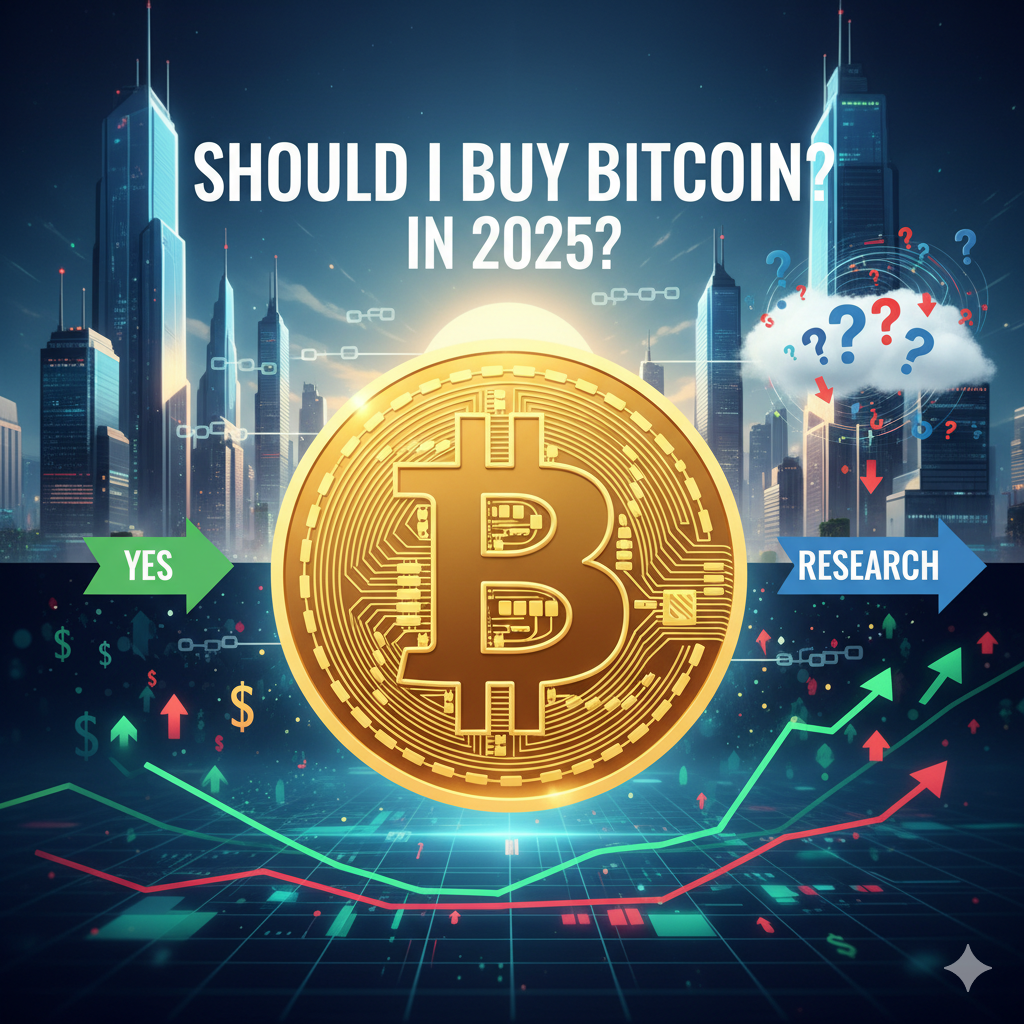Table of Contents
Should I Buy Bitcoin in 2025?
Short answer: Maybe — it depends on your risk tolerance, investment horizon, and whether you believe the long-term trends (scarcity, institutional adoption, favorable regulation) will outweigh the risks (volatility, regulatory uncertainty, competition).
In this article, we’ll explore:
- Where Bitcoin might be headed in 2025
- The advantages and disadvantages of buying now
- Key factors to watch
- Who it might make sense for, and who should probably wait
What’s the Outlook for Bitcoin in 2025?
- Price Predictions are Bullish (with Caveats): Analysts from firms like Galaxy Digital, Matrixport, & Standard Chartered have projected Bitcoin reaching $150,000 to $200,000+ by end of 2025, depending on institutional flows, regulatory changes, and macroeconomic conditions. CNBC
- Supply Constraints: The Bitcoin halving (which reduces the reward for miners) means fewer new BTC entering the market. Coupled with strong demand, that could push prices upward. Forbes
- Regulation & Institutional Adoption: Spot Bitcoin ETFs (particularly in the U.S.), institutional interest, and possibly positive regulatory reforms are seen as strong tailwinds. CNBC
The Case For Buying Bitcoin in 2025
- High potential upside
If you believe in the projections, there’s an opportunity for significant gains. Given Bitcoin’s past cycles, many think the upside could be worth the risk. - Scarcity / Digital Gold Narrative
The capped supply (21 million BTC) means it’s often thought of as an inflation hedge or store of value, especially in uncertain economic times. Forbes - Growing adoption & infrastructure
More financial institutions, corporations, ETFs, custodial services, and regulators are building frameworks around Bitcoin, which improves trust and lowers friction. CNBC - Diversification
For many investors, having some exposure to Bitcoin (not all of their capital) offers diversification — especially if much of their portfolio is in stocks, bonds, real estate. It can behave differently than traditional assets in certain economic scenarios.
The Risks / Downsides to Consider
- Volatility is extremely high
Price swings of 20-30% (sometimes more) over short periods are common. This can be very stressful and potentially lead to losses, especially if buying at peaks. The National - Regulatory uncertainty
Laws around crypto differ wildly by country. New taxes, restrictions, or even bans could hurt price or make holding/trading difficult. The Motley Fool - Security & fraud risks
Wallets, exchanges, and DeFi platforms can be hacked. Misplacing private keys means permanent loss. Scams, fraudulent schemes are also concerns. tsib-gov.org - Competition & technological risks
Other blockchains and digital assets may compete. Also, if something like quantum computing or a major technical flaw emerges, that could impact Bitcoin’s value. Nasdaq - Environmental and energy concerns
Bitcoin mining uses a lot of energy. There is increasing pressure from regulators, investors, and the public regarding environmental sustainability. That could lead to costs, regulation, or reputational damage. CryptoCurrency.ind.in

What Should You Watch Before You Buy?
If you’re leaning toward buying Bitcoin, keep an eye on:
- Regulatory developments (both local & international)
- The performance of spot Bitcoin ETFs and institutional inflows
- Macro trends: inflation, interest rates, dollar strength/weakness
- Halving cycles and how miners are behaving
- Bitcoin’s network adoption metrics: transactions, active addresses, etc.
Who Might It Make Sense For — And Who Might Be Better Off Waiting
| Person Type | Might Make Sense | Might Be Better to Wait |
|---|---|---|
| Long-term investor who can tolerate volatility | ✅ Yes — they may benefit from compounding upside and adoption trends. | No strong action needed short-term. |
| Someone wanting quick profits / speculative trader | Possibly, but high risk. Entry timing is critical. | If unsure about timing, might misspeak a loss. |
| Risk-averse individuals or those unable to lose much capital | Better to limit exposure or avoid large allocations. | Waiting for clearer signals (regulation, market correction). |
| Portfolio diversifier | Small % allocation may make sense. | If exposure is already heavy in risky assets, maybe reduce. |
Price Scenarios to Consider
- Bull Case: Regulatory clarity, strong ETF/institution adoption, weak dollar → Bitcoin goes toward $180,000-$250,000+ by end of year or soon after.
- Moderate Case: Some institutional support & mixed regulation → price growth but with sharp corrections. Might see $100,000-$150,000 swings.
- Bear Case: Regulatory crackdowns, macroeconomic issues (e.g. recession, rate hikes), competition from other crypto or digital currencies → Bitcoin could drop significantly (to maybe $70,000-$90,000 or lower) before any recovery.
Conclusion
If I were you, here’s what I’d think:
- Buy a small amount if you believe in the long-term potential and are comfortable with risk.
- Don’t allocate more than you can afford to lose. Bitcoin is not “safe money.”
- Use dollar-cost averaging (buy in pieces over time) rather than putting a lump sum in at once.
- Make sure you have secure storage (cold wallet, trusted custodian).
- Always stay updated on regulation and macroeconomic trends.
Final Thoughts
So, should you buy Bitcoin in 2025? Yes — but with caution. It could be a powerful part of a diversified portfolio, especially if you believe the tailwinds (scarcity, institutional use, favorable regulation) will remain strong. But it’s not for everyone. If volatility, security risks, or regulatory changes worry you, you might wait for clearer signals.
Important Disclaimer
This blog post is for educational and informational purposes only. It does not constitute financial, investment, or trading advice.
Buying, holding, or trading Bitcoin (or any cryptocurrency) involves substantial risk. Prices can be volatile, regulations can change, and there is always a chance of losing part or all of your investment.
You should independently verify information, consider your own financial situation, risk tolerance, and if needed, consult with a qualified professional before making any investment decisions. Growth Plan does not take responsibility for your investment choices or outcomes.
If you in interested in learning new things, you may have a good time reading Top 2025 Trends in Learning & Development: AI, Microlearning, and the Future of Employee Learning









